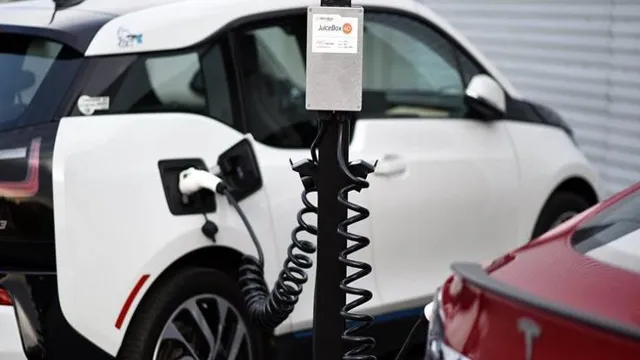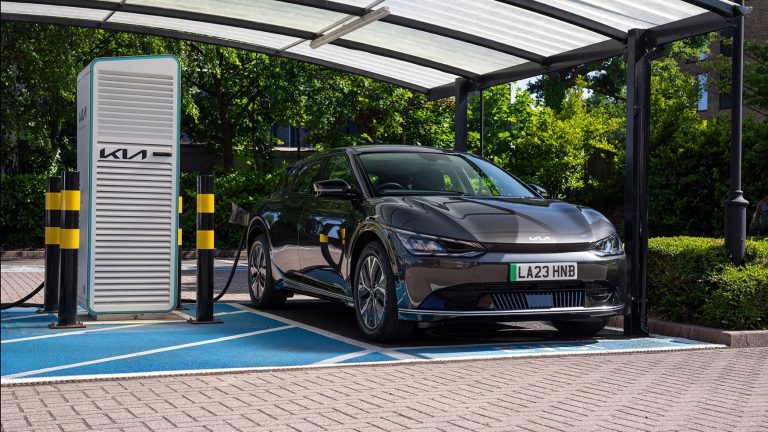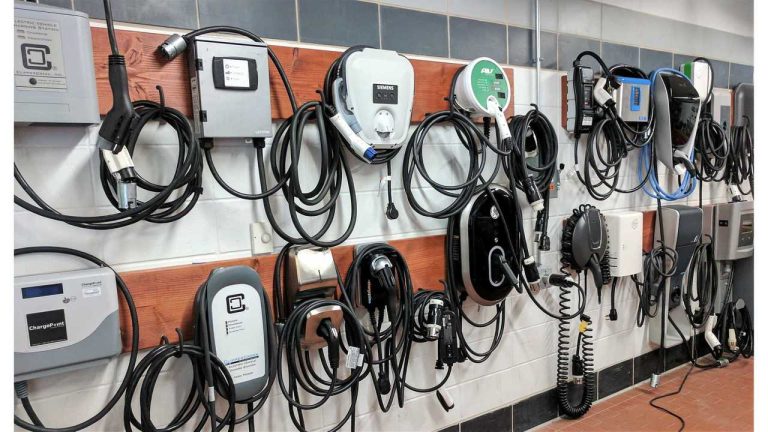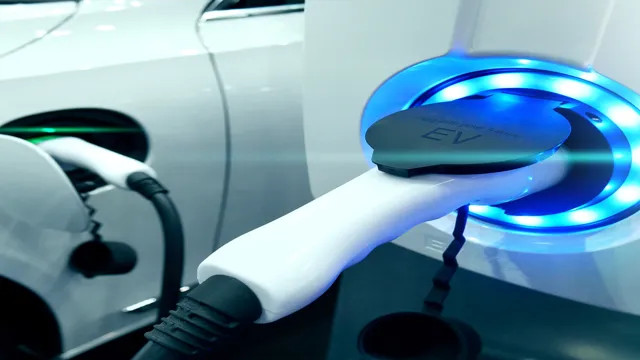Ford EV: Unraveling the Mystery of Charger Amps!
Remember that exhilarating feeling of cruising down the highway, wind whipping through your hair, knowing you’re leaving a whisper-quiet footprint on the planet? Now, imagine amplifying that thrill with the lightning-fast charge of a perfectly matched Ford EV charger. But wait, hold on to your horses (or should we say, electrons?), because choosing the right charger amperage can be just as important as picking the dreamiest road trip destination.
Here’s the truth: not all amps are created equal, especially when it comes to powering your Ford EV. The wrong choice could mean frustratingly slow charging, potential safety hazards, or even overburdening your home’s electrical system. But fear not, intrepid eco-warrior! This guide is your roadmap to navigating the exciting world of Ford EV charger amps. Buckle up, because we’re about to:
- Demystify the magic of amps and their impact on charging speed and safety.
- Unveil the secret codes behind different Ford EV models and their compatible charger amp ranges.
- Empower you to choose the perfect charger, considering your driving habits, home setup, and future electric dreams.
- Go beyond just amps by exploring smart charging features, energy efficiency tips, and even government incentives waiting to sweeten the deal.
So, ditch the charging anxiety and prepare to unlock the full potential of your Ford EV. Are you ready to charge smarter, faster, and greener? Let’s go!
Choosing the Right Charger amperage: Power Up Your Ford EV, Not Your Frustration
Imagine zooming down the highway in your Ford EV, leaving only clean air in your wake. But that exhilarating feeling can quickly fade if your EV spends hours tethered to a charger, inching its way towards a full battery. The culprit? The wrong amperage. Just like picking the right fuel for your car, choosing the correct charger amperage is crucial for your Ford EV’s performance, safety, and even your wallet.
Using the right amperage unlocks a trifecta of benefits:
- Faster Charging: Ditch the wait! Higher amperage translates to quicker charging, getting you back on the road sooner.
- Efficiency: Optimize your energy use. Choosing the right amperage for your needs prevents unnecessary power loss and keeps your electricity bills in check.
- Safety: Safety first! An improper amperage can overload your home’s electrical system, posing a potential fire hazard.
Now, Ford offers a diverse lineup of electric vehicles, each with its own charging requirements. The Mustang Mach-E, for example, might thrive on a different amperage level than the rugged F-150 Lightning. Don’t worry, we’ll delve deeper into specific model compatibilities and charger options soon!
Remember, choosing the right Ford EV charger amperage is more than just a technical detail; it’s the key to a seamless, efficient, and safe electric driving experience. Let’s navigate the world of amperage together and ensure your Ford EV charges like a champ!
Understanding Amperage in Ford EV Chargers:
Before we dive into the specific amp needs of your Ford EV, let’s crack the code on amps themselves. Amps, short for amperes, measure the flow of electricity, similar to how gallons measure water flow. In simpler terms, the higher the amperage, the more electricity flows in a given time. Now, why does this matter for your Ford EV?
Think of your charger as a water hose filling your EV’s battery. A low-amp charger is like a leaky hose, taking forever to fill the tank. Conversely, a high-amp charger acts like a powerful fire hose, juicing up your battery much faster. But remember, more isn’t always better. Just like a fire hose can burst a leaky pipe, overloading your system with excessive amperage can be dangerous.
Here’s where AC vs. DC charging comes in:
- AC charging: This is your typical home outlet charging, offering lower amps (typically 12 amps or 16 amps) for slower, overnight charging. Think of it as a gentle trickle filling your battery.
- DC Fast charging: These public stations deliver higher amps (50 kW to 350 kW), powering your car in minutes, like a forceful gush from a professional car wash.
So, how does amperage impact your Ford EV?
- Charging speed: The most obvious connection. Higher amps translate to faster charging, perfect for quick top-ups before hitting the road.
- Safety: Using an amperage exceeding your car’s or home system’s capacity can overload circuits, potentially causing damage or even fires. Safety first!
- Efficiency: While higher amps charge faster, they also consume more energy. Choosing the right amperage for your needs optimizes energy use and keeps your electricity bills in check.
Remember, amps are like the secret sauce of EV charging. Understanding their role is crucial for making informed decisions that ensure your Ford EV charges safely, efficiently, and at the perfect speed for your needs. Stay tuned as we delve deeper into specific Ford EV models and their ideal amp requirements!
Demystifying Ford EV Charger Amps:
Model Compatibility & Charger Amp Ranges:
| Model | Maximum AC Charging Amps | Compatible Ford Chargers |
|---|---|---|
| Mustang Mach-E | 48 amps | Mobile Charger (up to 32 amps), Connected Charge Station (up to 48 amps), Charge Station Pro (up to 80 amps) |
| F-150 Lightning | 80 amps | Mobile Charger (up to 32 amps), Charge Station Pro (up to 80 amps) |
| E-Transit | 48 amps | Mobile Charger (up to 32 amps), Connected Charge Station (up to 48 amps), Charge Station Pro (up to 80 amps) |
| Escape PHEV | 16 amps | Mobile Charger (up to 16 amps) |
drive_spreadsheetExport to Sheets
II. Ford’s Official Chargers & Amp Offerings:
- Mobile Charger: Plugs into 120V or 240V outlets. Delivers:
- 12 amps on 120V (slowest)
- Up to 32 amps on 240V (faster, requires compatible outlet and wiring)
- Connected Charge Station: Plugs into 240V outlets. Delivers:
- Up to 48 amps (fastest for compatible models, requires compatible outlet and wiring)
- Charge Station Pro: Plugs into 240V outlets. Delivers:
- Up to 80 amps (fastest for compatible models, requires compatible outlet and wiring)
III. Factors Influencing Your Choice of Amperage:
- Battery Size: Larger batteries take longer to charge, so higher amps are generally beneficial.
- Driving Habits: More miles driven often necessitate faster charging, favoring higher amps.
- Home Electrical System: Most homes have 120V outlets, but 240V is needed for higher amps. Consult an electrician for compatibility and installation.
- Budget: Mobile chargers are more affordable but slower, while Charge Station Pro offers the fastest charging but requires installation.
- Convenience: Consider how often you need fast charging and whether portability is important.
Choosing the Right Charger Amperage:
Picking the perfect Ford EV charger amperage can feel overwhelming, but fear not! This guide will walk you through the process, addressing common concerns and pointing you towards helpful resources.
Step 1: Understand Your Needs
- Model & Compatibility: Refer to the table in Section I to confirm your model’s maximum supported amperage. Exceeding this won’t damage your car, but it won’t charge faster.
- Battery Size: Bigger batteries take longer to charge. If you have a large battery (e.g., F-150 Lightning’s Extended Range) and prioritize fast charging, consider higher amps.
- Driving Habits: Frequent long trips benefit from faster charging, while occasional city driving might be fine with a slower charger.
Step 2: Evaluate Your Home Electrical System
- Most homes have 120V outlets, which only support up to 16 amps. This is sufficient for the Escape PHEV’s Mobile Charger, but inadequate for faster charging.
- For higher amps (32, 48, 80), you’ll need a 240V outlet and potentially upgraded wiring. Consult a qualified electrician to assess your system’s capacity and recommend any necessary upgrades.
Step 3: Weighing Amperage Options & Addressing Concerns
- Overloading Circuits: Exceeding your circuit’s capacity can trip breakers and damage equipment. A qualified electrician can advise on safe amperage for your specific circuit.
- Potential Damage: Using a charger exceeding your car’s supported amperage won’t harm your car, but it won’t charge faster. Stick to compatible options.
Example:
Let’s say you drive a Mustang Mach-E GT with a standard battery and mostly commute within the city. You have a standard 120V outlet.
- Your car supports up to 48 amps.
- Your driving habits don’t necessitate super-fast charging.
- Your 120V outlet limits you to 16 amps.
Decision: The Mobile Charger (up to 16 amps) plugged into your 120V outlet provides a safe and convenient solution for your needs.
Step 4: Consider Convenience & Budget
- Mobile Chargers: Affordable and portable, but slower charging (12 or 32 amps).
- Connected Charge Station: Faster charging (up to 48 amps), but requires installation.
- Charge Station Pro: Fastest charging (up to 80 amps), but requires professional installation and is the priciest option.
Remember: Convenience and budget can influence your choice. If you frequently need fast charging, a higher-amp charger might be worth the investment.
Beyond Amps: Additional Considerations:
While amperage plays a crucial role in charging speed, several other factors warrant your attention for a well-rounded decision:
Charging Levels:
- Level 1: Uses standard 120V outlets found in most homes, delivering slow charging (1.4-3.3 kW). Suitable for occasional top-ups.
- Level 2: Requires a 240V outlet (dryer outlet) and offers faster charging (6.6-19.2 kW). Ideal for home charging most models.
- DC Fast Charging: Delivers the fastest charging (50-350 kW) using public stations, perfect for long trips but incurs usage fees.
Smart Charging Features:
- Wi-Fi Connectivity: Monitor and manage charging remotely, schedule charging during off-peak hours for potential cost savings.
- Load Balancing: Prevents overloading circuits by automatically adjusting charging power based on other household electricity demands.
- Energy Monitoring: Track energy consumption associated with charging for better budgeting and eco-conscious choices.
Energy Efficiency:
- Look for chargers with high energy efficiency ratings to minimize energy loss during charging.
- Consider smart features that optimize charging based on battery level and grid conditions, potentially reducing energy consumption.
Future-proofing:
- Choose a charger with ample amperage headroom to accommodate potential future EV purchases with larger batteries.
- Opt for smart chargers with upgradeable firmware to stay compatible with evolving technology.
Government Incentives:
- Many countries and regions offer financial incentives to encourage EV adoption, including rebates, tax credits, and grants for home charger installation.
- Research available programs in your area to potentially offset the cost of your charger.
Remember, the “perfect” charger depends on your individual needs and circumstances. Carefully consider your driving habits, budget, electrical system, and future plans before making a choice. Consulting a qualified electrician and utilizing government resources can ensure a safe, efficient, and future-proof charging solution for your Ford EV.
Frequently Asked Questions (FAQs):
1. What happens if I use a charger with higher amps than recommended for my car?
While using a charger exceeding your car’s supported amperage won’t damage it, it won’t charge any faster. The car automatically regulates the accepted current to its safe limit. However, exceeding your home circuit’s capacity can trip breakers and damage equipment. Always stick to compatible chargers and consult an electrician for safe amperage choices for your circuit.
2. Can I upgrade my home electrical system for faster charging?
Yes, upgrading your home electrical system to a 240V outlet and potentially thicker wiring can enable faster charging (32+ amps) using compatible chargers. However, consult a qualified electrician for a thorough assessment of your system’s capacity, potential upgrade needs, and associated costs to ensure safety and proper functionality.
3. Where can I find a qualified electrician for charger installation?
Several resources can help you find qualified electricians:
- National Electrical Contractors Association (NECA): https://www.necanet.org/
- International Association of Certified Home Inspectors (InterNACHI): https://www.nachi.org/
- Your local utility company: They may have recommendations or programs for EV charger installations.
- Online directories: Search for electricians specializing in EV charging installations in your area.
4. What if I have concerns about overloading my circuit or potential damage from using a charger with higher amps?
Always prioritize safety. Never exceed your circuit’s capacity or use chargers exceeding your car’s recommended amperage. Consult a qualified electrician to assess your system, recommend safe amperage limits, and suggest any necessary upgrades for your desired charging speed.
5. Do you have any advice for readers with specific concerns raised in the comments section?
I can definitely help! Please share any specific concerns you’ve seen in the comments, and I’ll do my best to address them with accurate and relevant information. Remember, safety and informed decision-making are key when choosing and using EV chargers.
Conclusion:
Navigating the world of Ford EV charger amps can feel daunting, but fear not! This guide has equipped you with the knowledge and tools to make an informed decision. Remember:
- Understand your needs: Consider your driving habits, battery size, and budget to determine your ideal amperage range.
- Respect your home’s electrical system: Consult a qualified electrician to assess its capacity and recommend safe options for faster charging (240V outlets and upgrades might be necessary).
- Explore beyond amps: Smart features, energy efficiency, and future-proofing can enhance your charging experience.
- Seek government incentives: Take advantage of rebates, tax credits, and grants to offset installation costs.
Remember, choosing the right charger empowers you to embrace the convenience and sustainability of electric driving. Don’t hesitate to consult qualified professionals and utilize available resources to ensure a safe, efficient, and future-proof solution for your Ford EV. Now, take charge and confidently embark on your electrified journey!




